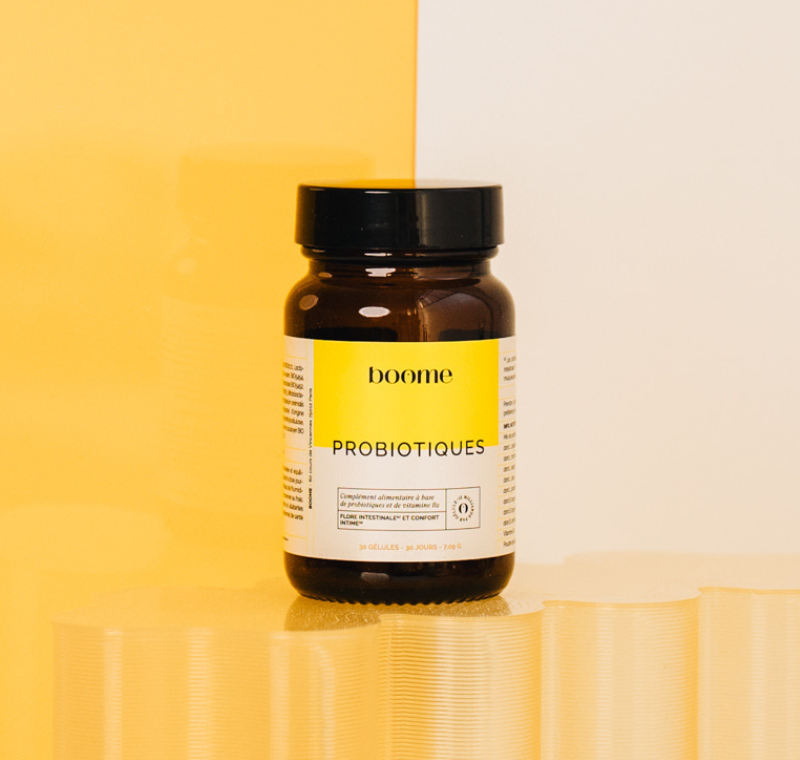
You've just found out you're pregnant, your belly isn't visible yet, but your metabolism is already revving up and your needs are changing! Good news: summer can be an ally, if you adjust your diet a little.
Pauline Gouth, a nutrition expert, tells you all about the essential nutrients to prioritize to support your body and your baby during this first trimester...
1. Priority to fresh foods… but digestible
The first trimester of pregnancy is often marked by a slowdown in digestion (hello progesterone), and cravings for fresh vegetables can push you towards repeated raw vegetables... not always well tolerated.
🔬Digestion slows down physiologically from the first weeks of pregnancy to promote the absorption of essential nutrients [1].
The tip for expectant mothers : combine softness and freshness.
- Favor warm to cold preparations, cooked al dente, such as cooled steamed vegetables or homemade cold soups (such as mild gazpacho, zucchini velouté, etc.).
- Avoid raw food at every meal, especially if you are sensitive or prone to digestive disorders such as bloating.
Tips : Keep the base cooked (steamed vegetables, quinoa, hard-boiled eggs) and add a fresh touch at the end (mint, lemon juice). Slightly cooled potatoes and sweet potatoes can also be interesting for their satiating effect and digestibility.

Achat express
2. Hydration ++ but not just water
Your blood volume increases during the first months of pregnancy. In summer, the risk of dehydration is increased, which can increase fatigue and nausea.
🔬Inadequate hydration is associated with a higher risk of nausea, constipation and fatigue in pregnant women [2].
To integrate:
- Mineral-rich waters for magnesium and sodium (important in hot weather).
- Cold infusions : Lemon, Ginger, Lemon balm, Linden.
- Fresh fruits rich in water : Watermelon, Melon, Peach, etc. Choose whole fruits for more fiber and vitamins.
To avoid (even in infusion): Sage, Pennyroyal, Liquorice, Roman Chamomile, Lemon Verbena, Fennel, Green Anise, Thyme, Ginseng, Peppermint.
And if you're wondering about coffee during pregnancy, moderate consumption (maximum one cup of coffee per day) is generally recommended.
Tips : Prepare a carafe of infused water the night before (Lemon + Basil + Cucumber) that you drink throughout the day (also remember to have a large glass of water as soon as you wake up). You can even add a pinch of unrefined salt if you sweat a lot. And remember to drink between 1.5 and 2 liters per day minimum.
3. Support digestive tolerance and reduce nausea
Nausea affects 70 to 80% of pregnant women during the first trimester. It is exacerbated by fasting, heat, strong odors, fatty foods, or large meals.
🔬Ginger has shown significant efficacy in reducing nausea during pregnancy in pregnant women (optimal dosage: 1g/day) [3].
Cold foods are often better tolerated than hot foods because they release less odor, which is often responsible for disgust.
Foods that are generally well tolerated are:
- Rice, compotes, bread, plant-based yogurt, banana, lemon
- Mild cold soups, light purees, cereal cakes
- Fresh grated ginger or infusion
Tips : Keep dry snacks on hand (crackers, whole-wheat bread) to munch on before you get up and feel the first signs of nausea , to avoid an empty stomach. And choose small, light meals.
4. Maintain a good folate intake… without overdoing it on salads
Folate requirements in pregnant women increase from conception to prevent neural tube defects. In the embryo, the neural tube is the part that will later form the brain and spinal cord.
🔬The recommended intake of folate is 400 micrograms per day at least one month before pregnancy and during the first trimester [4].
Focus on foods rich in folate:
- Lightly cooked green leafy vegetables (broccoli, green beans, steamed spinach, etc.)
- Legumes (lentils, chickpeas, dried beans, etc.)
- Wholemeal bread, brewer's yeast, eggs
But even a rich and balanced diet may not be enough to cover these requirements: the soil is impoverished, losses of these precious nutrients during cooking are frequent, while needs explode from the moment of fertilization.
Tip : That's why Boome has formulated its pregnancy vitamins with a specific dose of bioavailable and natural vitamin B9, which replaces synthetic folic acid. You can start as early as preconception.
What's the difference between folate and folic acid? It's simple. Folate is the natural form of vitamin B9 and is naturally present in your daily diet. Folic acid, on the other hand, is a synthetic form of vitamin B9. The problem with folic acid is that it must be converted in the body into its active form (5-MTHF) to be used, and this process is sometimes ineffective for some people. That's why we chose to use folate in our Pregnancy Multivitamin.
Want to know more? That's perfect timing, we'll tell you everything in our dedicated article " What is vitamin B9 used for ?"
5. Don’t skip Omega 3
Omega 3 contributes to the development of the baby's brain and retina, and supports the emotional balance of the mother-to-be.
🔬 EPA and DHA are essential for fetal neurogenesis and support the healthy course of pregnancy [5].
You can find them in different foods rich in Omega 3 :
- Oily fish (sardines, mackerel, trout, etc.)
- Organic eggs
- Flaxseed, rapeseed oil (but less well converted)
These essential fatty acids are particularly important for maternal and fetal health. DHA accumulates primarily in the fetal brain during the third trimester, but stores begin to build up in the first few weeks.
What if you're not getting enough ? Boome's Vegan Omega 3 treatment is perfect: based on microalgae (plant-based), well-dosed, pollutant-free, ultra-digestible, and designed for pregnancy.
Want to become an expert on the subject? Discover our article on the benefits of Omega 3 during pregnancy .
6. Vitamin D + calcium: the combo not to be forgotten (even under the sun)
From the first trimester, the baby's skeleton begins to form. And surprise: exposure to the sun in summer is not always enough to guarantee good vitamin D status (especially if you avoid exposure). However, vitamin D and calcium form a key duo for this stage: they contribute to bone mineralization, proper muscle development, and immunity.
🔬 7 out of 10 women have a vitamin D deficiency, even in summer [6].
Recommended intakes are difficult to achieve through diet alone, especially if you consume little or no dairy products. Hence the importance of an enriched formula adapted to pregnancy, available as a supplement.
You can rely on good sources when preparing meals :
- Animal origin: Sardines, Small whole fish, Eggs
- Plant origin: Tofu, Almonds, Green vegetables, Fortified plant milk, Fortified soy yogurt
In addition, they are a good source of protein, useful for this demanding period.
Tips : If you are not very exposed or if you have dark skin (melanin = natural UV filter), vitamin D supplementation is clearly recommended from the start of pregnancy.
7. Anti-bacterial precautions ++ with heat
As you probably already know, during pregnancy your immunity changes and you are more vulnerable to foodborne illnesses such as listeriosis or salmonella. Heat promotes bacterial proliferation.
🔬 Listeriosis is rare, but 20 times more common in pregnant women [7]. Cooking is your best friend in this situation.
In practice:
- Avoid raw or undercooked foods (raw meat, raw fish, eggs)
- Wash fruits, vegetables and herbs well
- Avoid cut products (cheeses, cold meats, etc.)
- Do not leave perishable foods at room temperature for more than one hour to limit the risk of food poisoning.
Tips : If you want to make a cold salad, prepare it yourself and eat it within the hour (or keep it in the fridge for up to 24 hours). And avoid picnics left in the sun 😬
8. Manage sugar cravings
With hormones (especially progesterone), blood sugar can be more unstable in the first trimester, which promotes sugar cravings... amplified by heat and fatigue.
🔬 Unstable blood sugar levels in early pregnancy can disrupt metabolic balance [8].
How to do it?
- Choose hydrating and satisfying snacks: sugar-free compote + almonds, homemade smoothie + chia seeds, yogurt + red fruits + hazelnuts.
- Consume enough fiber (30 to 35g per day) to help stabilize blood sugar. As a bonus, it helps prevent constipation, which is common, especially during early pregnancy.
- Limit overly sweet industrial ice creams, sugary soft drinks, overly processed products made with white flour or rich in fast sugars (glycemic peaks ++) which will give you sugar cravings 10 minutes later.
Tips : Make your own homemade ice cream (frozen banana + almond puree + mixed red fruits) = zero added sugar, 100% delicious.
Every pregnancy begins with its share of discoveries, and sometimes challenges. The key is to take it step by step, day by day , choosing what feels good and what you tolerate. Your body is already working intensely, a healthy diet rich in varied foods can become a real lever to support it, without pressure or perfection. And a well-constructed pregnancy diet, monitoring the quality of the food, can really help you achieve the intakes you and your baby need.
What you put on your plate (and in your carafe) matters, but so does how you experience this time.
Do not hesitate to ask your doctor or dietitian for advice if you have any doubts about your eating habits .
Bibliography
[1] Kumar, R., et al. (2015). Physiological changes during pregnancy . Clinical Obstetrics and Gynecology.
[2] Institute of Medicine. (2005). Dietary Reference Intakes for Water, Potassium, Sodium, Chloride, and Sulfate .
[3] Borrelli, F., et al. (2005). Effectiveness and safety of ginger in the treatment of pregnancy-induced nausea and vomiting . Obstetrics & Gynecology.
[4] EFSA Panel on Dietetic Products. (2014). Scientific opinion on dietary reference values for folate . EFSA Journal.
[5] Coletta, JM, et al. (2010). DHA for the treatment of pregnant women at risk of early preterm birth . American Journal of Obstetrics & Gynecology.
[6] Bodnar, LM, et al. (2007). High prevalence of vitamin D insufficiency in pregnant women . The Journal of Nutrition.
[7] Centers for Disease Control and Prevention. (2022). Listeria (Listeriosis) .
[8] Zhu, Y., et al. (2016). Glycemic variability and gestational metabolic outcomes . Diabetes Care.









